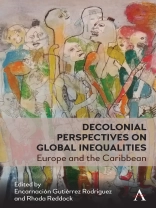This edited collection aims to contribute to the decolonial social and cultural analyses of global entangled inequalities by focusing on their local articulations. Drawing on empirical research conducted by scholars in Germany, Trinidad and Tobago, Australia and in Canada, the book engages with the conceptual framework of global inequalities and the methodological perspective on entanglement. It does so by approaching global inequalities and their local articulations: (a) global political economy, structural violence, entangled inequalities; (b) financial inequalities and state injustice; (c) inequality within and beyond race and ethnicity; (d) decolonial struggles against inequality; and (e) decolonial futurities. It is on these grounds that this edited volume aims to contribute to the analysis of entangled global inequalities by mobilizing a decolonial framework paying attention to the intersections of race, gender, labour, finances and the State.
Tabela de Conteúdo
List of Figures; Acknowledgements; Introduction: Decolonial Perspectives on Entangled Inequalities: Europe and the Caribbean, Encarnación Gutiérrez Rodríguez and Rhoda Reddock; Part I Global Political Economy, Structural Violence, Entangled Inequalities; Chapter 1. From Mercantilism to Neoliberalism and the Financial Crisis of 2008, Kari Polanyi Levitt; Chapter 2. Welcome to Paradise: Neoliberalism, Violence and the Social and Gender Crisis in the Caribbean, Rhoda Reddock; Chapter 3. Temporal-Spatial Entanglements of Global Inequalities: On Care and Domestic Work in Western Europe, Encarnación Gutiérrez Rodríguez; Part II Financial Inequalities and State Injustice; Chapter 4. The Financial and Social Versatility of Payments: The Intersection of Household Payments, Financial Flows, and the Politics of Distribution, Andreas Langenohl; Chapter 5. Towards a Rethinking of Structural Vulnerabilities: Private Equity, Financialization and Work, Norbert Ebert; Chapter 6. Exploring Alienation, Bias, and Coloniality in Twenty-First-Century Magistrates’ Courts of Trinidad and Tobago, Dylan Kerrigan; Chapter 7. The Decolonial Ends of Caribbean Ethnography: Notes on Dialectics, Imagination and the State of Practice, Shelene Gomes and Scott Timcke; Part III Inequality Within and Beyond Race and Ethnicity; Chapter 8. Contending with Binaries: Rethinking Mixedness Through the Caribbean Dougla Body, Sue-Ann Barratt; Chapter 9. Mapping Caribbean Racisms: Unsettling the Creole, Unseating Whiteness, Shirley Anne Tate; Chapter 10. Norms, Capacities and Olfactory Politics in a North-Eastern Romanian Town, Andreea Racleș; Chapter 11. Branch Out – Transforming Education: Reflections on the Potential and Future of Transcultural Spaces and Learning in Higher Education, Marah Theuerl; Part IV Decolonial Struggles against Inequality; Chapter 12. Contestations of Memory and Erasure: Rastafarians, Modernity and Coloniality in Trinidad and Tobago, Tyehimba Salandy; Chapter 13. The (Dis-)entanglement of Solidarity with/ from Global Inequalities: Decolonial Critiques and Challenges, Sebastian Garbe; Chapter 14. ‘From Yourself, to the Family, to the Community and to the World’ (Napuli Paul): Thinking Local and Global Entanglements in the Refugee Movement, Lisa Doppler; List of Contributors; Index.
Sobre o autor
Encarnación Gutiérrez Rodríguez is a sociologist engaged with decolonial-feminist-queer analysis on affect, care, conviviality, migration, racism and work.
Rhoda Reddock is a feminist sociologist, social historian, development studies scholar and social activist.












